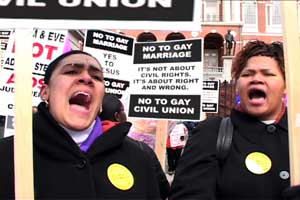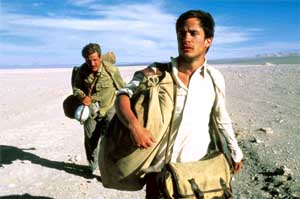-
- FMA fails in the House
- SLDN announces new legal challenge to ‘Don’t Ask, Don’t Tell’
- GLBTs more at ease in workplace
- The science of sex and God – it’s in the genes
- Conservative Mass. House picks social liberal before same-sex marriage fight
- Attorney general: Marriage amendment would harm economy
- National News Briefs
- World News Briefs
Arts & Entertainment
Revolutionary
Same-sex marriage, Che Guevara, women on stage
Published Thursday, 07-Oct-2004 in issue 876
Tying the Knot
***
Directed by Jim de Seve
As hot-button election year issues go, same-sex marriage is probably second only to the war in Iraq. (Pundits agree: focusing on the former distracts America from the latter.) Jim de Seve’s Tying the Knot examines the subject of same-sex marriage in a thoughtful and surprisingly non-preachy manner. What sets it apart from your standard talking-heads documentary is his focus: how not having the right to marry traumatically impacts two devoted lesbian/gay couples. (A third story, about a New York City cop who lost his partner in the 9/11 tragedy, doesn’t get the screen time it deserves.) Mickie and Lois, two Tampa, Fla., policewomen, had just celebrated their 10th anniversary when Lois was killed in the line of duty. Mickie tries to collect Lois’ pension, only to be flatly denied, setting into motion a lengthy and exhausting legal battle – a fight that could have been avoided if her relationship had been legally recognized.
Then there’s Sam (has there been a more sympathetic “character” in movies this year?), a humble Oklahoma rancher who loses his partner of 23 years, Earl, and discovers the will he left behind is missing a crucial third signature. In a nightmarish unfolding of events, an estranged cousin of Earl’s challenges the will and ends up stealing away Sam’s property, going so far as to heartlessly charge him back rent.
If Tying the Knot is missing anything, it’s what the gay-rights movement itself is missing these days: anger, a sense of outrage that gays are denied the 1,138 federal rights taken for granted – even abused – by so many married heterosexual couples. One of the reasons our progress in society has been so slow, I think, is because gay people by and large are so damned polite and reasonable. (Mickie and Sam perfectly illustrate this meek, turn-the-other-cheek conservatism.) On the other hand, Seve (also the film’s cinematographer) is smart enough to know that a less aggressive posture is probably the best way to court mainstream acceptance. (Ken Cinema, Oct. 8-14)
The Motorcycle Diaries
**1/2
Directed by Walter Salles
Written by Jose Rivera
Starring Gael Garcia Bernal, Rodrigo de la Serna
A film about a future political revolutionary that is lyrical and eloquent, even touching? Considering that the revolutionary in question is Che Guevara, such adjectives would seem to be almost inappropriate, even tasteless. (This is the man, after all, who oversaw the execution of more than 500 political prisoners.) Yet Walter Salles’ The Motorcycle Diaries manages to be all three things – at least in its final 45 minutes.
Playwright Jose Rivera based his script on the books The Motorcycle Diaries by Ernesto (“Che”) Guevara and With Che Through Latin America, by Alberto Granado. In 1952, when Guevara (played by the stunning Gael Garcia Bernal) was 23 and Granado (Rodrigo de la Serna) 29, the two friends made an 8,000 mile, four-month “journey of self-discovery” across South America to get to know a “continent we had only known in books,” according to Guevara. Che was only a year away from graduating medical school when he and Granado, a wandering biochemist, left the middle-class comforts of Buenos Aires and set off on Alberto’s rickety, 12-year-old motorbike nicknamed “The Mighty One.” Their goal was to be in Venezuela to celebrate Alberto’s 30th birthday, with a stop in between to the San Pablo leper colony. (Guevara specialized in leprosy in med school, we’re told.) The trip becomes, for Guevara, a life-altering adventure that takes him, Granado would later write, “to the farthest reaches of the human spirit.”
Though the film’s first hour and 20 minutes are entertaining – their bike repeatedly breaks down, they scam for food and shelter, they chase skirt – this section (with the exception of Serna’s charismatic performance) is overlong and routine. It isn’t until Che and Alberto arrive at the leper colony that The Motorcycle Diaries becomes something special: we see Che transform from a restless adventurer into an impassioned humanist who dedicates himself to fighting injustice and caring for the sick and dying. Still, it gnaws at you, the way Salles (Central Station) and Rivera so thoroughly romanticize Guevara (beginning with the casting of Bernal). True, this is only half of his story; it’s simply difficult to reconcile who Guevara was with who he would become. It’s rather like putting a halo on a pit bull. (Hillcrest Cinemas)
Stage Beauty
***
Directed by Richard Eyre
Written by Jeffrey Hatcher
Starring Billy Crudup, Claire Danes, Rupert Everett
In the fascinating, fact-based drama Stage Beauty, Billy Crudup (Almost Famous) finally has found a starring vehicle worthy of his talents.
Adapted by Jeffrey Hatcher from his cheeky play Compleat Female Stage Beauty (“the best play no one saw,” according to a theater critic friend), this is the story of Edward (Ned) Kynaston (Crudup), a bisexual theater actor and cross-dresser who won fame playing women’s roles in 17th-century London, a time when women were not permitted to perform on stage. Things change when a thoroughly bored Charles II (a droll, dolled-up Rupert Everett) decides, for the sake of variety, to allow women to appear in public venues, out from the shadows steps Ned’s quietly ambitious, love-struck dresser, Maria (perky Claire Danes, Crudup’s real-life girlfriend), a closet thespian who wants to audition for the role of Desdemona in an upcoming production of Othello. Before Ned has time to fluff his wigs, Charles II has issued a proclamation baring men from men playing women and Maria has become an acting sensation. Dropped by his secret lover, the Duke of Buckingham (Ben Chaplin), Ned finds himself out of work and scorned by the very people who made him a superstar. The solution? He must reinvent himself by playing male roles, which means unlearning years of coquettish mannerisms and fluttery hand movements.
The deftly entertaining Stage Beauty, directed with precision and sensitivity by Richard Eyre (Iris), offers some highly interesting observations about identity and the true nature of masculinity. Eyre has assembled a superlative cast (including Tom Wilkinson, Edward Fox and Hugh Bonneville) to showcase Hatcher’s smart dialogue. It is this superlative cast that makes it memorable. Ned is a tricky, demanding role to pull off, and Crudup rises to the occasion magnificently. (His final scene with Danes, where he strangles her on stage during a climactic moment in Othello, will have you on the edge of your seat.) For a pretty man he’s rather a hag of a woman, but that only makes you appreciate Crudup’s skillful work all the more. (Opens Oct. 15 at the Hillcrest Cinemas)
|
|
Copyright © 2003-2025 Uptown Publications




